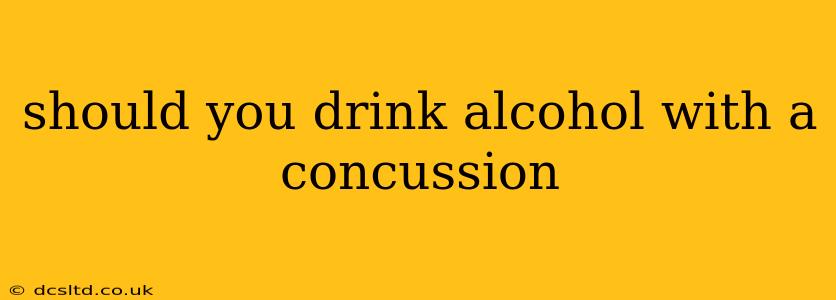A concussion, a type of traumatic brain injury (TBI), disrupts normal brain function. While the immediate symptoms like headache, dizziness, and nausea are widely known, the recovery process is complex and requires careful attention to avoid complications. One crucial aspect of concussion recovery is abstaining from alcohol. The question, "Should you drink alcohol with a concussion?" has a resounding and unequivocal answer: No.
Alcohol can significantly hinder the healing process and potentially worsen the effects of a concussion. Let's explore why.
Why Alcohol is Detrimental After a Concussion
Alcohol is a central nervous system depressant. This means it slows down brain activity. After a concussion, your brain is already struggling to function optimally; adding alcohol further impairs its ability to heal and recover. The effects can be severe and long-lasting.
Increased Risk of Prolonged Symptoms
Alcohol can exacerbate existing concussion symptoms, potentially prolonging your recovery time. This could mean experiencing headaches, dizziness, and cognitive difficulties for a much longer period.
Interference with Brain Repair
The brain requires time and rest to repair itself after a concussion. Alcohol interferes with this vital repair process, slowing down the healing and increasing the risk of long-term complications.
Dehydration and Electrolyte Imbalance
Alcohol is a diuretic, meaning it increases urination and can lead to dehydration. Dehydration can further strain your already compromised brain, worsening symptoms and hindering recovery. Alcohol also disrupts electrolyte balance, crucial for proper brain function.
Increased Risk of Bleeding in the Brain
In some cases, a concussion can cause bleeding within the brain (intracranial hemorrhage). Alcohol can increase the risk of this serious complication, potentially leading to life-threatening consequences.
What About "Moderate" Alcohol Consumption?
There's no safe level of alcohol consumption after a concussion. Even small amounts can negatively impact the healing process. The risks outweigh any perceived benefits. Complete abstinence is the safest course of action.
What to Do Instead of Alcohol
Focus on activities that promote healing and recovery:
- Rest: Get plenty of sleep and avoid strenuous activities.
- Hydration: Drink plenty of water and electrolytes.
- Nutrition: Eat a balanced diet rich in fruits, vegetables, and whole grains.
- Cognitive Rest: Avoid screens and mentally demanding tasks.
- Medical Follow-Up: Regular check-ups with your doctor are crucial.
How Long Should You Avoid Alcohol After a Concussion?
The duration of alcohol abstinence depends on the severity of the concussion and individual recovery progress. It's essential to consult your doctor for personalized advice. Generally, it's recommended to avoid alcohol until your symptoms have completely resolved and you've received medical clearance.
What are the Long-Term Effects of Alcohol Consumption After a Concussion?
Long-term effects can include persistent headaches, cognitive impairment (difficulty with memory, concentration, and processing information), and increased risk of developing post-concussion syndrome (PCS). PCS is a condition characterized by prolonged and debilitating symptoms that can significantly impact a person's quality of life.
What if I Already Drank Alcohol After My Concussion?
If you have already consumed alcohol after your concussion, it's essential to consult your doctor immediately. They can assess your condition and provide guidance on how to proceed. Don't hesitate to seek medical attention – early intervention is key.
This information is for general knowledge and does not constitute medical advice. Always consult with a healthcare professional for any health concerns or before making any decisions related to your health or treatment.
